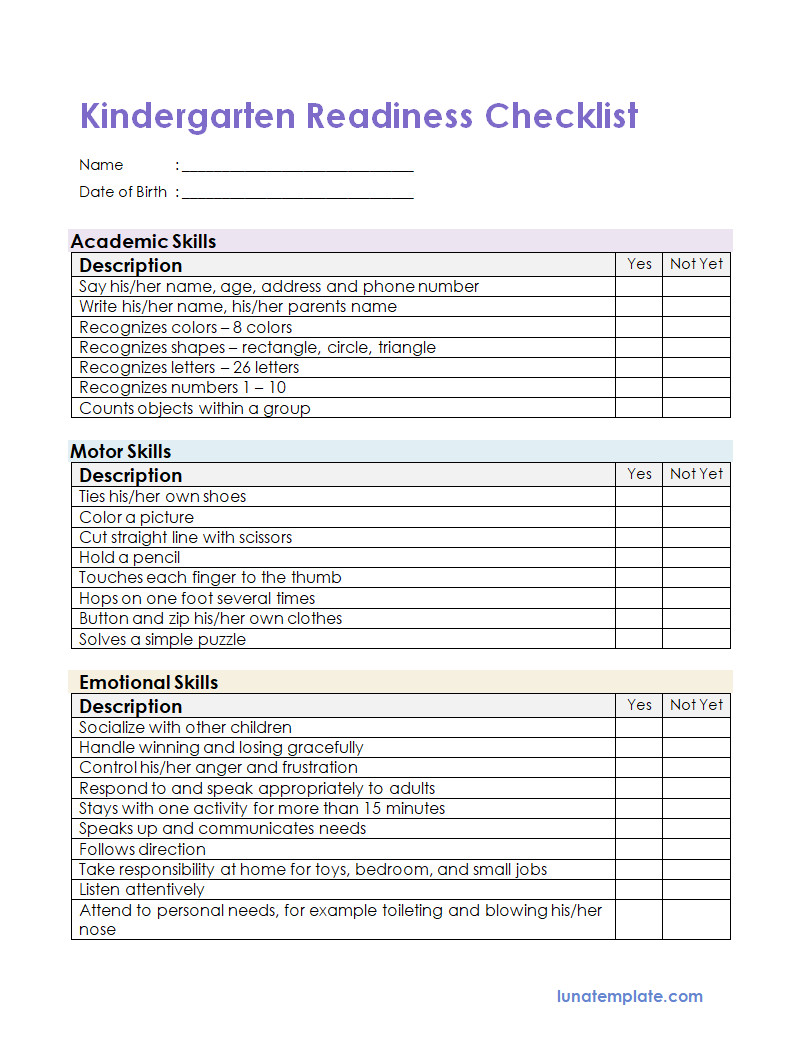Starting kindergarten is a big milestone in a child’s life. It marks the beginning of their formal education journey and lays the foundation for their future academic success. As a parent, you want to ensure that your child is well-prepared for this new chapter. One helpful tool that can assist you in assessing your child’s readiness is a kindergarten readiness checklist.
Designed for four and five-year-old, this checklist covers academic, motor, and emotional skills that are important for your child’s success in kindergarten. It allows you to assess your child’s physical, social, emotional, and cognitive development and identify areas that may need extra attention before they start school.
What is a Kindergarten Readiness Checklist?
A kindergarten readiness checklist is a comprehensive tool that helps parents evaluate their child’s preparedness for kindergarten. It provides a list of skills and milestones that children typically achieve before entering kindergarten. The checklist covers various domains, including academic, motor, and emotional skills, to ensure a well-rounded assessment of your child’s development.
By using a kindergarten readiness checklist, parents can gain insights into their child’s strengths and areas that may require additional support. It serves as a guide to help parents identify any gaps in their child’s development and focus on specific skills before they start kindergarten.

Benefits of Using a Kindergarten Readiness Checklist
Using a kindergarten readiness checklist offers several benefits for both parents and children:
- Assessment of Key Skills: The checklist provides a comprehensive assessment of academic, motor, and emotional skills, allowing parents to gauge their child’s overall readiness for kindergarten.
- Identifying Areas for Improvement: By using the checklist, parents can identify specific areas where their child may need extra attention and support. This allows for targeted interventions to ensure that their child is adequately prepared for kindergarten.
- Setting Realistic Expectations: The checklist helps parents set realistic expectations for their child’s development and readiness. It provides a framework for understanding age-appropriate skills and milestones, reducing unnecessary stress or pressure.
- Collaboration with Teachers: The checklist can be shared with your child’s future kindergarten teacher, fostering open communication and collaboration between parents and educators. It allows teachers to gain insights into each child’s unique needs and tailor their instruction accordingly.
- Enhancing Parental Involvement: The checklist encourages parental involvement in their child’s development and education. It provides a tangible tool for parents to actively engage with their child’s progress and take proactive steps to support their learning.
When Should You Start Using a Kindergarten Checklist?
It is recommended to start using a kindergarten readiness checklist several months before your child is scheduled to start kindergarten. This allows sufficient time to assess their skills, address any areas of concern, and provide appropriate interventions if needed. Starting early also gives parents the opportunity to engage in activities that promote the development of necessary skills.
By starting the assessment process early, parents can ensure that their child is well-prepared and confident when they step foot into the kindergarten classroom. It also gives parents ample time to seek guidance from educators or professionals if they identify any significant challenges or delays in their child’s development.
Tips for Parents to Prepare Their Children for Kindergarten
Preparing your child for kindergarten involves more than just completing a checklist. Here are some practical tips for parents to help their children thrive in their kindergarten journey:
- Create a Structured Routine: Establishing a consistent daily routine helps children develop self-discipline and time management skills. Set regular bedtimes, meal times, and playtimes to provide structure and stability in their lives.
- Promote Independence: Encourage your child to become more independent by allowing them to complete age-appropriate tasks on their own. This can include dressing themselves, tying their shoelaces, and organizing their belongings.
- Read Together: Reading with your child is an excellent way to foster a love for learning and improve their language and literacy skills. Set aside dedicated reading time and explore various books and genres together.
- Encourage Social Interaction: Arrange playdates or enroll your child in social activities to help them develop social skills and build friendships. Teach them how to take turns, share, and communicate effectively with others.
- Practice Fine Motor Skills: Engage your child in activities that enhance their fine motor skills, such as coloring, drawing, cutting with safety scissors, and building with blocks. These activities strengthen their hand-eye coordination and dexterity.
- Expose Them to Numbers and Counting: Incorporate counting and number recognition into everyday activities. Count objects, play number games, and introduce basic math concepts to familiarize your child with numbers.
Conclusion
A kindergarten readiness checklist is a valuable tool for parents to assess their child’s readiness for kindergarten. It allows for a comprehensive evaluation of academic, motor, and emotional skills, providing insights into areas that may need extra attention. By starting early and using the checklist as a guide, parents can support their child’s development and ensure a smooth transition into kindergarten.
Remember, preparing your child for kindergarten goes beyond completing a checklist; it involves creating a nurturing environment, promoting independence, and fostering a love for learning.
Kindergarten Readiness Checklist Template – Word